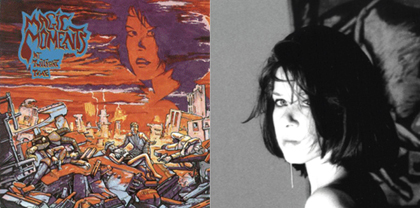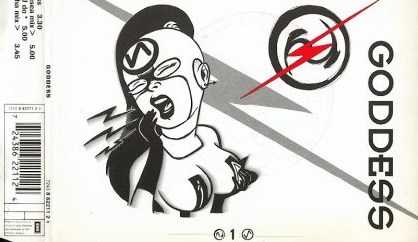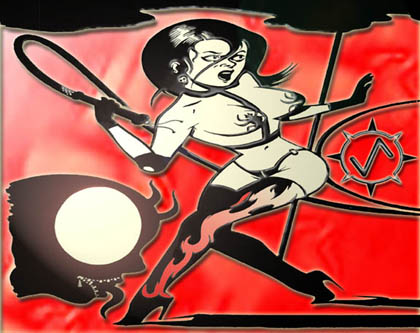|
Interesting MMATT facts #52 - the haunting face of 'Darkness' on the cover of our "Creavolution" CD was styled from this photograph of Isabelle... MM: Your 4th release on M&E followed soon after in May 1995; “Les Danses Sauvages” (M&E 294). Sabotage finished the year as our 8th best selling band, making it your most successful on the label. It was, of course, also the year you became a legend with Magic Moments At Twilight Time fans! When I wanted a face so haunting it could torment the soul of a lovelorn man (I guess you’d need to know the narrative of the album to fully understand that!), I knew there was only one woman it could be. Er… does this count as fawning? I thought the cover was brilliantly drawn by Thayen Rich, a masterpiece of psychotronic art. So how did you feel to see your own face staring back at you from so many MMATT album ads?
IG: Of course that was very nice even though I didn’t realize that in the beginning. Hey, it’s always nice if people like what you’re doing and of course it’s flattering when someone thinks your face looks nice, it’s not nice when they tell you the other way round, you know. All good with this, worse things happened to me, if I may say so J MM: Your 5th and final M&E release was “Sensuous Magic” (M&E 324, Jan. 96), which I like to think was a reciprocal tribute to myself. Say nothing, and bless you for leaving me my delusions! This time we thought we’d really seen the last of you when came the great shock that you’d signed to EMI! It was a move seen by some of our supporters as “collaborating with the enemy,” one I sort of understood, though did not personally share. I know I feared for you a bit, while being thrilled for you at the same time, the majors not having the best of reputations. I remember you stating quite categorically that the band had no intention of compromising their music and that EMI hadn’t asked you to, and my own reviews of your releases for them seem to support that, how did you feel that worked out for you?
IG: For us it was a chance to produce with Daniel B from Front 242, who needed a bigger budget because he lives from producer work. EMI was willing to pay that and paid for a promotion and interviews in Germany. We went to Belgium to start the album production and we |
had great support from Daniel and other artists there. It was a nice experience. New ways of working also. We could produce the way we wanted to and went on tour with F242 and played in bigger halls, which was great. Front 242 borrowed our new drummer for their own live set, so it was a nice tour with them. The people at the EMI label (Spin Records) we belonged to were just the same as the people were at Dark Star. These guys have no idea about music production and artist life, trust me. They just don’t. They see potential to sell something, but they have no idea how to sell it, that’s my personal opinion. Honestly, they all suck. It’s like a bank, nothing else. They give you money, because they hope to earn money back from you then. They don’t give you money because they like you. We quit after 2 years and opened our own label, it was obvious we could do the same work without uninspired majors or indie labels. We anyway had to do all the production work, artwork, photos and song writing by ourselves, so what for a label? Money can come from other sources also.
MM: So, during your time on EMI’s Spin Records label, you released two editions of “Sexploitation Cinema” (working with likes of Front 242 must have been amazing), “Goddess” and “Schlager” (a curious title for a Sabotage album, I thought!); how did you find the experience of working with the backing of a major label and how did your time with them finally come to an end?
IG: As I said we did that without thinking about success. “Schlager” is a word game, because it is used for the cheap music genre and in parallel it’s someone who beats people up. We did that one when we were asked to open a launch event for a Hugo Boss perfume, they wanted a strong woman and a band and that’s why they booked us. We played at the Popkomm stage for Hugo Boss then, the first band who ever did that, playing there live directly. EMI thought the title “Sexploitation Cinema” and cover (an Italian artist did that for us) were maybe offending people, but the fashion people didn’t have any problem at all. Hugo Boss is a sponsor of the Guggenheim Museum in NY since years. People with an open mind and heart. Record labels don’t understand that! Hugo Boss paid a lot of money for us to play and we even opened 10 so called ‘Hugo Club Nights’ all over Germany, Switzerland and Austria for them, but the EMI people wouldn’t even shake their hands or thank them. That was the point where we said: listen guys, you just behave like idiots and we quit, so that’s what we did. We also could do that easily, because Hugo Boss had taken over in terms of finance things, haha. It still felt really good, I must confess. Telling Spin Records to kiss our behind, it felt really good. Yes. Definitely. I still have to smile thinking about it. |
|||||

.gif)
.gif)


